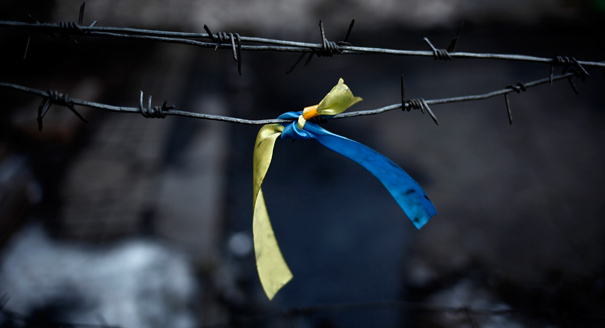It took some time for EU leaders to grasp the significance of the events engulfing Ukraine.
What they have seen since November is the violence. What they have read are the reports of police brutality, of activists being abducted, of journalists being beaten up, of public buildings being occupied.
During all this, the protesters have refused to leave the streets. Ukraine’s president, Viktor Yanukovych, first pushed through a package of laws to suppress civil liberties and then rescinded it. But neither response led to an end of the demonstrations. Yanukovych has miscalculated.
The reason is that an invisible and powerful revolution is taking place in Ukraine. It is about values and it will continue. History has shown this before. Time runs in favor of both the demonstrations—and Europe—and against Russia’s authoritarian influence. That is why, in the long term, Russia’s offer of cheap loans and cheap gas to Yanukovych as a means to prop up Ukraine’s ailing economy is not sustainable.
During last weekend’s Munich Security Conference, Catherine Ashton, the EU’s foreign policy chief, held a chat on the podium with the leaders of Serbia and Kosovo about the recent EU-brokered deal on normalizing relations between the two Balkan neighbors.
Who would have expected this conversation after so many years of bloodshed and mistrust between ethnic Albanians and Serbs? It was that invisible revolution of values—that lure of Europe—that brought the two leaders to the negotiating table.
Ukraine is going through an invisible revolution, too. It is an immensely difficult and different process, not just because of the geographical division of the country between West and East and the power of the oligarchs. There is also the Russian factor.
Russian President Vladimir Putin knows the importance of Ukraine for his country’s own political future. If Ukraine opts for the European path, the contagion of Western values, sooner or later, will reach Russia.
That is why Herman Van Rompuy, president of the European Council, believes that time is on the EU’s side. This may seem strange given the fragility of Ukraine, the unpredictability of Yanukovych, and the uncertainty over what Putin may do once his Olympic Games are over. It may even seem naive.
“Some people think Europeans are naive, that we prefer carrots to sticks,” Van Rompuy said at the Munich Security Conference.
“Now, I am not saying that we cannot sometimes play our hand more strongly,” he said. “But surely it is a bad idea to let foul play undercut the very values that constitute our power of attraction in the first place—a power of attraction that brought down the Berlin Wall,” Van Rompuy added. “Our biggest carrot is our way of life; our biggest stick: a closed door.”
Despite the dangerous standoff in Ukraine between Yanukovych and the opposition, the clock cannot be turned back. Events unfolding in the country have woken the EU up to what it can offer to help this invisible revolution succeed.
Materially, Europe cannot match Putin’s offer of cheap loans and cheap gas. But the EU, the United States, and the International Monetary Fund may be able to put together a short lifeline for the economy. Any aid will be conditional on the introduction of reforms.
It is difficult, however, to see Ukraine’s opposition leaders accepting such aid as long as Yanukovych is in power. His resignation is one of their main demands. It is also hard to see how Yanukovych could even begin to introduce reforms based on transparency and accountability. They would undermine his power base.
It is the political offer that matters. The EU needs to take the invisible revolution into account, which is about making values a reality. What this means is that at some stage, the EU will have to confront the issue of offering Ukraine membership.
The effects of this invisible revolution will take time to materialize, just as the collapse of the Berlin Wall in 1989 only happened after many years of pressure on the communist regimes by dissident movements.
“Sometimes in the heat of events, in the stream of declarations and tweets, we lose sight of the time factor. We frantically look at hours and days, forgetting the years and decades,” Van Rompuy told the audience in Munich. “We lose sight of slow evolutions, of subtle trends. Subtler than the ‘decline of the West’ or the ‘rise of the Rest.’” So it is with Ukraine.








